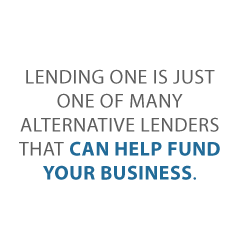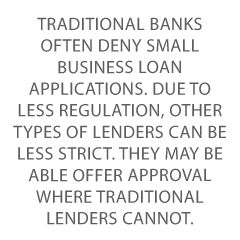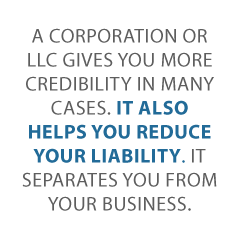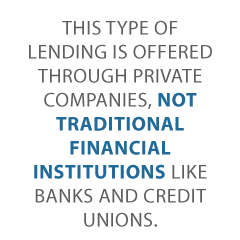If you are a real estate investor, then you need to know about Lending One. It is a direct real estate investing lender that has been around since 2014. They are newer, but they are quickly establishing themselves in the industry. Here is what you need to know to get a jump on deciding whether they are right for you, or not.
The company began as Crestar Funding, but changed its name in November 2016 to LendingOne. In the press release, they say that they realize the potential for this company was much larger than they originally thought.
Is Lending One a Good Option for You?
Bill Green (CEO) and Matthew Neisser (COO) joined forces in 2014 to open a private real estate lending company. The mission? To use technology to streamline and speed up the process of borrowing for real estate investment.
With Green’s skill and expertise in creating world class organizations and Neisser’s background in technology and finance, it did just that. As a result, we have the Lending One of today.. It provides a faster and easier way to apply for and receive approval for loans. Furthermore, it allows borrowers to more easily grow their real estate portfolios.
They make loans to citizens of the United States, Canadian citizens, and permanent resident aliens.
Check out our trustworthy list of seven vendors to help you build business credit. Conquer any recession!
What Types of Loans Do They Offer?
There are a range of options when it comes to loans with Lending One. They include:
Fix-and-Flip
For example, if your real estate game is to purchase homes to rehab and then sell for profit, then fix-and-flip loans are for you. Amazingly, rate quotes are available online in as little as 2 minutes.
They will loan up to 80% of the cost of the project, or LTC (Loan to Cost.) The minimum loan amount is $75,000. They do not list a maximum. Also, there is no interest charged on unused funds, and there is no penalty for early repayments. The minimum FICO required for a Fix-and-Flip loan is not noted on the website. They state only:
“We are much more flexible in the FICO score we accept and are happy to work with each client’s individual situations.”
Additionally, you will need to have the following documents on hand.
- Sales contract
- One month’s bank statement
- Construction budget
- List of properties currently owned
- 2 years tax returns
- LLC operating agreement, or Articles of Incorporation
Remember to send copies. Never send originals.
Rental Loans
Now, if your business is more “fix it up and rent it out” based, you will be more interested in the rental loans. With these, there are two options. The first, RentalOne, and then the Apartment Bridge loans.
Check out our trustworthy list of seven vendors to help you build business credit. Conquer any recession!
RentalOne
This option is available on either a 5 or 7-year ARM (adjustable rate mortgage.) Or, if you would rather, as a 30-year fixed loan. Loan amounts go up to $2 million.
The FICO requirement for the RentalOne loan is flexible, same as with the Fix and Flip loans. However, these requirements change without warning. The truth is, you really do not know until you try. You do not have to turn over income verification, not even a W-2. Instead, they consider the cash flow of the property itself in the decision-making process. It appears, however, that there is a prepayment penalty on this one.
Multifamily Bridge Loans
These are available for buildings with 5 to 200 rental units. There is no interest on funds that are not drawn, and the terms range from 12 to 36 months. The loan amount is up to $15 million.
There is a minimum FICO requirement of 650, but closing is super-fast, sometimes in as little as 20 business days.
New Construction Loans
Another product they offer is new construction loans. Amounts range up to $5 million. These loans are available in terms ranging from 12 to 24 months with fast approval. Eligible properties include single family, townhomes, condos, and multi-family buildings.
Rehab to Rent
If you want to rehab a home to rent for profit, you can do that as well. Here is how it works. First, you apply for a Fix-and-Flip loan. Then, when the rehab is complete, they will roll it into a 30-year fixed rental loan. As a bonus, since you are already a customer with the Fix-and-Flip, you will get a discount on the fees toward your rental loan.
Lending One Pre-Approval
There is an easy, fast pre-approval process, and it’s free. You can have your terms and rates in writing before you ever submit an offer. Honestly, the proof of funds provided with pre-approval makes submitting an offer easier than ever. Pre-approvals are available for amounts up to $5,000,000.
Lending One Partner Program
The company also offers a partner program. It’s a community of investors, realtors, real estate attorneys, and third parties. Potential partners have the opportunity through the program to earn compensation in exchange for client referrals. Interest parties are invited and encouraged to participate.
The following options exist:
- The Referral Partner Program is for real estate investors, real estate attorneys, and other third partners that want to refer business to Lending One.
- The Broker Partner Program is for mortgage brokers or loan origination consultants that wish to refer business.
- Finally, the corporate partner program is designed for businesses that provide goods or services to those that invest in real estate not occupied by the owner.
Partner consultants contact potential partners within 24 hours of application to the program.
Making Payments on Your Lending One Loan
They have a contract with FCI Lender Services. This company services and accepts payment for loans. Borrowers get a welcome package with directions directly from FCI about 2 to 3 weeks after the loan closes. Payments are made via ACH, and are due on the first of the month.
Lending One and the Better Business Bureau
It never hurts to seek out what type of online reputation a company has. Online reviews are huge these days. For this company we found the following.
The Better Business Bureau
As it turns out, not only do they have an A+ rating with the Better Business Bureau, but they are actually accredited since February 2017.
In that whole time, there has only been one complaint. The company addressed it and it was solved. There are only 3 reviews, and unfortunately the most recent one is negative. However, it is from someone who was in the middle of the loan process and the process was put on hold due to the COVID-19 pandemic. This is an extreme circumstance, of course.
Check out our trustworthy list of seven vendors to help you build business credit. Conquer any recession!
Benefits of Using Lending One
They use proprietary technology that allows them to streamline the underwriting process. As a result, application processing is much faster. Along with pre-approval and good reviews from previous customers, they sound like superstars. Yet, nothing’s perfect, right?
The Downside of Using Lending One
The main drawback is, they are a young company. Of course, that will not always be the case. One can only hope they will continue the positive path they are on and continue to work to get rid of any bugs.
Another negative is that you would not be able to get enough money for larger projects due to the maximum loan amounts offered. With a max of $2 million for rehab and $5 million for new construction, commercial jobs are pretty much out the window. Lending One would not be an option for those looking to do commercial flips or flips on more expensive homes in higher income areas.
A Quick Review of Real Estate Investing
If you happen to be newer to the world of real estate investing, you may want to consider these tips before you go much further.
Formally Incorporate
Many real estate investment lenders will not lend to individuals. Form a legal business so that you have the best options available when it comes to funding. This is just one of many lenders that will only lend to companies. An S-corp, LLC, or corporation will work.
Tell the Truth
In real estate, there is even more importance placed on doing honest business. If you cut corners when working on a rehab, or if you are a bad landlord, word will get out. This will not only cause problems when you try to sell or rent in the future, but it can detour future funding efforts as well.
Location Matters
This is especially true in relation to flipping homes. A fabulous home in a terrible location is probably not going to yield a significant enough profit.
Watch the Markets
Pay attention to what is selling and where. Take note of trends in what people are willing to pay for, as well as what they are not. This will help you figure out how to best use your funds.
A Word About Credit
This lender is more flexible than many lenders when it comes to credit. However, they make it very clear credit history still counts. Consider these tips to raise your credit score if you need to.
- First, make sure you have separate business credit. This includes getting and using an EIN, and incorporating, which as noted above is something that needs to be done anyway. Also, you need to have separate contact information for your business and a dedicated business bank account.
- Next, get copies of all your credit reports.
- Look first at what is affecting your score in a negative way. Then you will know where to focus your efforts.
- After that, review the report for mistakes.
- Report mistakes to the issuing agency, in writing.
- Only send copies of backup documentation, not originals.
- Monitor your personal and business credit score continually using a credit monitoring service. This will help you stay on top of things. You can monitor your credit with both Dun and Bradstreet and Experian through Credit Suite for 90% less than it would cost you at the business credit reporting agencies. You can monitor your credit with Equifax through them directly.
Of course, none of this really matters if you are not making your payments on time. Make sure you are doing that regardless. Nothing helps a credit score like consistent, on time payments.
Is Lending One for You?
In the end, Lending One isn’t a bad option. It does have higher interest rates and lower maximum loan amounts than some. However, they are also more lenient with their credit score requirements. That means if you are not able to get the funding you need somewhere else, they could be just what you need. They have a good reputation and offer a variety of loan options.
As with any decision on a lender, do you own research. Things change frequently, and the COVID-19 pandemic changed a lot of things. You’ll want to double check details such as loan amounts and interest rates. It seems though, despite being a young company, Lending One is doing pretty well, not only for themselves, but for their customers as well.
Are There Other Options? 
If you want financing for commercial flips, CreditSuite might be a better option. Financing ranges up to 20,000,000 which is much more suited to that type of project.
Loan-to-values range from 55-65%. Which one you can get depends on the purpose of the loan. Funding programs are available that include conventional property financing, money for investment properties and hard money loans, bridge loans, and loans for the purchase of commercial real estate. SBA loans are also an option. For renovation, you can get a loan-to-value of up to 60%. They have many other loan programs as well, including some for residential flips.
In the end, you just need to find which option will work best for you. Lending One is definitely one to consider. I’d even give them four out of five stars. But don’t stop there. Be sure to explore all your options.
The post Fund the Flip of Your Dreams with Lending One appeared first on Credit Suite.











